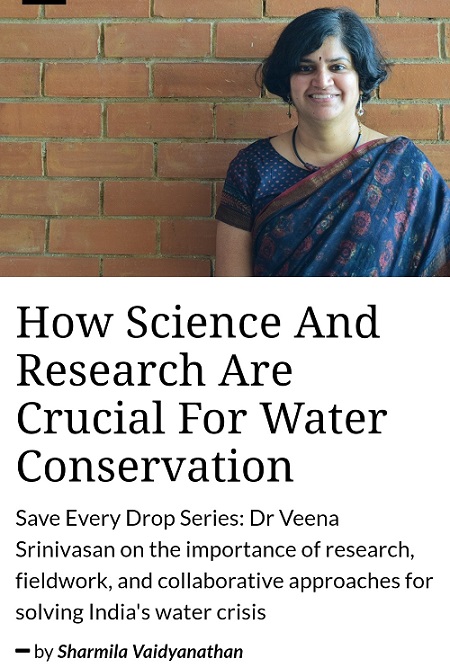Save Every Drop Series: Dr Veena Srinivasan on the importance of research, fieldwork, and collaborative approaches for solving India’s water crisis.
As published in Nature inFocus on 22 November, 2019.
In a 2017 paper written by Dr Veena Srinivasan, there is an illustration of a researcher standing next to a dry river, laptop in hand, questioning a farmer – “What do you mean the river is dry? My model predicts a flood.”
The paper titled ‘Doing Science That Matters to Address India’s Water Crisis’ informs us: “No matter how it is measured – water poverty, water vulnerability, water scarcity, water risk, water insecurity, or environmental water scarcity – by every measure, India is one of the most stressed countries in the world.”
In the wake of our biggest crisis, this may seem like old news. But as we look at the present climate crisis in dismay, researchers like Srinivasan will point us to the reality that somewhere this is our own undoing. In the absence of research to answer critical and fundamental questions, and a culture that encourages fieldwork or collaborative approaches, what Srinivasan conveys through the illustration is not humour, but the truth.
Srinivasan is a Senior Fellow and leads the Water, Land and Society Programme at the Ashoka Trust for Research in Ecology and the Environment (ATREE), Bangalore. She is also the Director, Centre for Social and Environmental Innovation, ATREE. She completed her PhD from Stanford in the Emmet Interdisciplinary Program in Environment and Resources. Her postdoctoral research involved developing a framework for a global freshwater initiative.
Through her research in the Arkavathy and Noyyal basins, Srinivasan was able to highlight the impact of human actions on water stress. Her research also aided in comprehending the reality of groundwater levels in South India. More recently, she has been involved in addressing the gaps in citizen-driven lake restoration projects in Bangalore.
In this interview, Srinivasan talks about the importance of field research, understanding where our water conservation policies stem from and why it is crucial to address human impacts on water.
Read the complete interview here.
